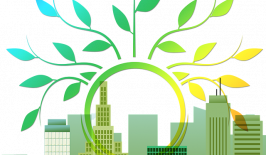Berlin-based Kaffeeform is taking the remnants of your cappuccinos, americanos and espressos and turning them into brand new, environmentally-friendly coffee cups.
If you work in a cafe or office with a professional coffee-making machine, you’ll know that after a hard day’s brewing you’ll have amassed quite a mountain of seemingly useless coffee grounds. Traditional wisdom dictates these grounds should be simply thrown away, especially in an office where a failure to do so results in the ire of your more cleanly colleagues.
Well, if you do ever find yourself on the receiving end of such a coffee-ground-based accusation, you now have an excuse for not throwing them away: they can be recycled into a new, innovative material.
Berlin based designer Julian Lechner has spent the last three years developing a new material derived from discarded coffee grounds and renewable raw materials – plant fibres, wood grains, and biopolymers. The substance, dubbed Kaffeeform, is then used to create various products, most notably and appropriately, coffee cups.
According to what’s laid out in Kaffeform’s mission, Lechner stumbled upon the idea of using coffee grinds as the basis of a new material while studying in Italy. After three years of experimentation and consultation with experts and scientists, Lechner finally arrived at a product which matched his demands, both in terms of physical properties and environmental impact – a practical and everyday example of cradle-to-cradle and the circular economy.
Now Lechner tours the various cafes of Berlin (and there are a lot) and gathers up their coffee grounds. They are then dried and sent to a special workshop which turns them into unique espresso and cappuccino cups. The waste of six cups of espresso can produce enough grounds to manufacture a whole cup and matching saucer.
The cups themselves have a warm dark colour, as well as being lightweight, durable, dishwasher safe, biodegradable and made for unlimited use. They even have a slight coffee odour, while each cup is unique in terms of colour and hue.
Lechner isn’t the first environmentally minded entrepreneur to realise the potential of discarded coffee grounds, with Spanish fashion company Ecoalf also using them as part of their process to create upcycled clothes. However, the ability to create an attractive and biodegradable alternative to plastic could have wider ramifications in the coffee business.
For example, next on the horizon for Kaffeeform is the Weducer cup, a disposable take-away coffee cup built to resemble the ubiquitous cardboard and plastic containers available from high street coffee chains.
 © Kaffeeform Also made of recycled coffee grounds, the WEDUCER model is designed for coffee on the go and inspired by classic takeaway cups.
© Kaffeeform Also made of recycled coffee grounds, the WEDUCER model is designed for coffee on the go and inspired by classic takeaway cups.If a Kaffeeform cup isn’t your thing, you can also request a wood-based variant developed from the wood flour of local sawmills.
A single Kaffeeform espresso cup currently retails online for 14.90 EUR, while a cappuccino cup goes for 19.90 EUR. Sets of up to eight of each variety are available on the Kaffeeform online shop.









